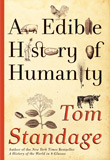Write your own review!
Margie
Review of An Edible History of Humanity
Tom Standage’s latest book presents history through the prism of food: how improvements to food production, food storage, and food distribution allowed for dramatic changes in human society – for example, empowering the transformation from a hunter-gatherer society to that of settled farmers. The author also examines other issues – such as the local food movement – in a balanced way, presenting the merits on both sides of the argument in an effort to find the middle ground. The text is presented in a very readable style, and even though it is essentially a history book, a comprehensive knowledge of world history is not a prerequisite for enjoyment.
John
An Edible History of Humanity
I found this to be an informative account of the impact of agriculture, and in some cases of specific foods, on human history.
I particularly enjoyed the accounts of the development of the spice trade and its impact on global exploration and the development of European colonial empires. There is also a good review of the failed attempts by the USSR and China to turn agriculture into productive state run collectives. The book is short enough not to get into too much minutiae but provides notes and a thorough bibliography for those seeking more information on specific subjects. I would recommend this to anyone interested in a good overview of this subject.
Elyse
Good Book, but Rather Dry
This book traces the connection between food and the rise of civilization, establishment of cities, the beginning of slavery, horticulture and mechanization – among many other things. Indeed, it seems from reading this book that it is food that is actually the root of all evil.
It is rather dry reading, if you are a history buff you would probably enjoy it. I chose to read it because I am interested in all aspects of food, but found it less interesting as I went on.
Heather
Thoughtful, but not particularly inspired ...
I am a little bit of a history buff, and this is a thoughtful and well-written look at how food has changed the course of human history. Certainly it filled in some gaps in my knowledge, particularly in relation to the spice trade; in fact, the mythology of how spices were acquired is one of the most fascinating parts of the book. Overall, though, this is not a "History is fun!" excursion. Chapters detailing the wholesale starvation of helpless populations by lunatic dictators are especially heartbreaking. Generally this is a sobering read, concise and logically laid out, but a bit bland. I didn't get any real feeling of passion from the author about his subject ... I kept feeling like something was "missing" from the book. It's good, yes, but not exceptional, and I wouldn't seek out this particular author again.
Mary Ann
Food For Thought
An Edible History of Humanity is slow going in the first couple of chapters, but if you stick with it you will be rewarded with how food has been used for so much more than sustenance. I was eager to learn about the many different aspects of food's interaction with the nation's of the world. I recommend this book to anyone that loves history, and little known facts.
Janice
An Edible History . .. .
An Edible History of Humanity is packed with information - at times interesting, and at other times really difficult to read through. This book would be well suited as additional reading for a college level history or sociology class. I would not recommend this as book club read.
Susan
Focus on Food
An Edible History of Humanity helped me look at food/agriculture and how it relates to industrialization, war and society in ways I had not before. Since I generally like histories that focus on a specific topic (e.g. salt, cod, coal), I found this book mostly enjoyable to read - there were, however, times when I felt more details than I wanted/needed were presented.
Jordann
No Plot
This book was the worst book I have ever had to read. My high school AP teacher assigned it for over the summer and it took me two months to even get through it. The book has absolutely no plot and I don't understand why anyone would willingly read this book about things that are not true and make not difference to our world anyway.




